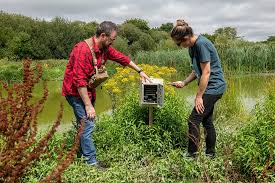Ecological Citizenship and the Co-Design of Inclusive and Resilient Pathways for Sustainable Transitions

June 2025
Ecological Citizen(s) Network+ is a multi-million-pound collaborative project led by the Royal College of Art (RCA), alongside the University of York's Stockholm Environment Institute and Wrexham University. The project mission is to “explore and catalyse Ecological Citizenship for positive climate action in a sustainable digital society”.
Professor Alec Shepley, Associate Dean for Research, is Co- Investigator on the project and heads up the Wrexham University (WU) project team. Alec, alongside WU researchers Daniel Knox, Dr Tracy Simpson and Dr Rebecca Upton, recently co-authored an article with colleagues from the Stockholm Environment Institute (Luke Gooding) and RCA (Emily Boxall, Robert Phillips, Charlotte Nordmoen). The article titled Ecological Citizenship and the Co-Design of Inclusive and Resilient Pathways for Sustainable Transitions was published in the Sustainability journal as part of the special issue Co-design and Social Innovation for Climate Neutrality.
The research discussed in the article explores how zero emissions and climate neutrality can be made a reality through a ‘people-centred’ approach. Considering how a socially innovative, co-designed approach to facilitating ecological citizenship (EC) can play a part in bringing about the required changes.
What Is Ecological Citizenship?
A shared civic responsibility to provide opportunity for citizens to work collectively on innovative solutions to environmental issues, often with a placed-based community focus. Enabling knowledge exchange and contribution to co-designed sustainability with the ‘traditional’ policymakers and field experts.
Social Innovation
The authors detail how the concept of social innovation is used to frame their exploration of EC, identifying social innovation as a driving force in empowering individuals and communities to get involved, take action and effect lasting environmental change. By “emphasising bottom-up engagement in shaping sustainable futures” the concept fits well with EC’s core tenets and aids the shift from ‘top-down’ governance and policy models.
Critical challenges to the social innovation concept, such as power dynamics impacting representation, the issue of access to ongoing resource without “strong institutional support”, and scalability of the often-local design are addressed in the article.
Mixed Method Approach
The mixed-methods approach carried out by the study was designed to lessen the challenges identified in relation to the social innovation concept:
- Roundtable Discussions
Industry practitioners with lived experiences exploring EC through various lenses whilst being encouraged to generate innovative ideas beyond the immediate obvious solutions. - ‘How Might We’ Workshops
Community groups, businesses, Non-Government Organisations, and local governments proposing solutions to the issues identified in the roundtable discussions. The sessions “also reflected the principles of EC itself, embracing collective responsibility, resource-conscious decision-making, and community-driven action.” - Voluntary, community, and social enterprise (VCSE) Sessions
Voluntary, community, and social enterprise representatives collaborating on grassroots environmental and societal knowledge exchange, networking and change creation.
Seven Tenets
Data analysis from the above-mentioned data collection identified seven key features of EC that can be grouped into three ‘clusters, with EC at the centre of it all:
Foundations of EC
-Place-specific: Grounded in local knowledge and lived experience.
- Legacy-focused: Oriented toward long-term ecological and social well-being.
Systemic and Adaptive
- Adaptability: Embracing change and uncertainty.
- Wider systems: Understanding the broader socio-ecological context.
Mechanisms of EC
- Web-of-life: Recognizing the interconnectedness of all life forms.
- Diversity: Valuing multiple perspectives and inclusive participation.
- Social justice: Addressing systemic inequalities in environmental impacts.
The findings highlighted that EC is not pre-set and easily defined. It is community being, collective experiences, placed-based and societal influence all helping to frame and shape change. Each tenet is considered in turn, in detail and in the context of EC.
Recommendations
A number of recommendations, based on the data findings, were made to promote transformation at local, regional, and national levels:
- Promote Co-Design and Participatory Governance;
- Create Policy Frameworks That Bridge Local and Global EC Practices;
- Foster Intergenerational Dialogue and Collaboration;
- Support Community-Led, Nature-Based Solutions;
- Develop Inclusive Sustainability Policies;
- Embed EC in Education and Public Awareness Campaigns;
- Leverage Digital Tools for Community Engagement and Data Collection;
- Integrate EC into Climate Action Plans.
Recommendations for future research were also made such as increased geographic scope (including international) and a longitudinal approach to understand the longer-term impacts of EC programmes. Limitations of the use of qualitative data were also noted, identifying the possibility of bias of those involved in the study and their environmentally focused leanings and possible underrepresentation of participants was discussed. Taking these into account for future research will enable enhanced exploration of the topic.
Conclusion
As society grapples with climate issues, ‘top-down’ governance and policy models are not enough on their own. The research emphasises the power of people-centred, participatory approaches. Involving communities in the co-creation of solutions means that EC fosters a sense of ownership, responsibility, and innovation from a ‘bottom-up’ approach.
The seven identified key dimensions of EC support solutions that are not only environmentally effective but also just, equitable across the generations and tailored to local needs.
The study shows that building a sustainable future is a shared responsibility that spans public, private, and community sectors. In applying EC’s principles, sustainability efforts can be flexible, inclusive, and fair.